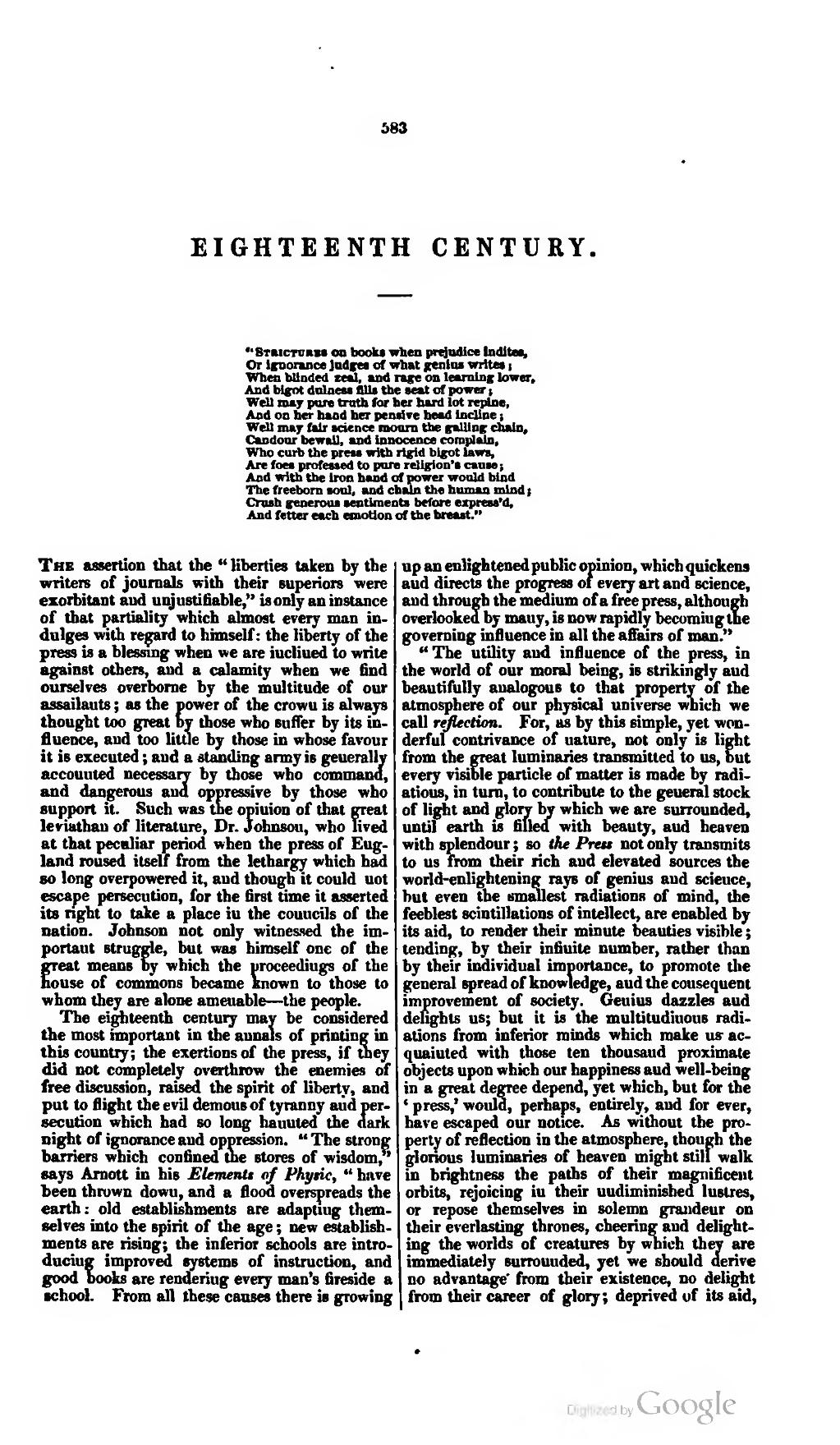583
EIGHTEENTH CENTURY.
"Stmctuui on booki wben pnjodice IndltM, Or Icnonnce Jodtn of what fcenliu vrtta i When blinded zeal, and rage on learning lower. And bigot dnlneu flUs the aeat at power ) Well mar Pore troth for her hard lot repine, And on her hand her penaive head incline; Well may (klr adence moom the galling chain. Candour bewail, and innocence complain. Who curb the preM with rigid bigot laws. Are foea professed to pore religion's caase; And with the iron tiand of power woold bind The freebom soul, and chain the human mind; Crush generous sentiments before express'd. And fetter each emoUon of the breast."
The assertion that the " liberties taken by the writers of journals with their superiors were exorbitant and unjustifiable," is only an instance of that partiality which almost every man in- dulges with regard to himself: the liberty of the press is a blessing when we are inclined to write against others, and a calamity when we find ourselves overborne by the multitude of our assailants; as the power of the crown is always thought too great by those who suffer by its in- fluence, and too little by those in whose favour it is executed; and a standing army is generally accounted necessarr by those who command, and dangerous and oppressive by those who support it. Such was the opinion of that great leviathan of literature. Dr. Johnson, who lived at that pecaliar period when the press of Eng- land roused itself from the lethargy which h^ so long overpowered it, and though it could not escape persecution, for the first time it asserted its nght to take a place in the councils of the nation. Johnson not only witnes.sed the im- portant struggle, but was himself one of the great means by which the proceedings of the bouse of commons became known to those to whom they are alone amenable — the people.
The eighteenth century mav be considered the most important in the annals of printing in this country; the exertions of the press, if uiey did not completely overthrow the enemies of free discussion, raised the spirit of liberty, and put to flight the evil demons of tyranny and per- secution which had so long haunted the dark night of ignorance and oppression. " The strong barriers which confined the stores of wisdom, says Amott in his Elementt of Physic, " have been thrown down, and a flood overspreads the earth : old establishments are adapting them- selves into the spirit of the age; new establish- ments are rising; the inferior schools are intro- ducing improved systems of instruction, and good books are rendering every man's fireside a •chool. From all these causes there is growing
up an enlightened public opinion, which quickens and directs the progress of every art and science, and through the medium of a free press, although overlooked by many, is now rapidly becoming the governing influence in all the affairs of man."
" The utility and influence of the press, in the world of our moral being, is strikingly and beautifully analogous to that property of the atmosphere of our physical universe wnicb we call reflection. For, as by this simple, yet won- derful contrivance of nature, not only is light from the great luminaries transmitted to us, but every visible particle of matter is made by radi- ations, in turn, to contribute to the general stock of light and glory by which we are surrounded, until earth is filled with beauty, and heaven with splendour; so (A« Prat not only transmits to us from their rich and elevated sources the world-enlightening rays of genius and science, but even the smallest radiations of mind, the feeblest scintillations of intellect, are enabled by its aid, to render their minute beauties visible; tending, by their infinite number, rather than by their individual importance, to promote the general spread of knowledge, and the consequent improvement of society. Genius dazzles and delights us; but it is the multitudinous radi- ations from inferior minds which make us- ac- quainted with those ten thousand proximate objects upon which our happiness and well-being in a great degree depend, yet which, but for the ' press,' would, perhaps, entirely, and for ever, have escaped our notice. As without the pro- perty of reflection in the atmosphere, though the glorious luminaries of heaven might still walk in brightness the paths of their magnificent orbits, rejoicing in their undiminished lustres, or repose themselves in solemn grandeur on their everlasting thrones, cheering and delight- ing the worlds of creatures by which they are immediately surrounded, yet we should derive no advantage' from their existence, no delight from their career of glory; deprived uf its aid.
VjOOQ IC
